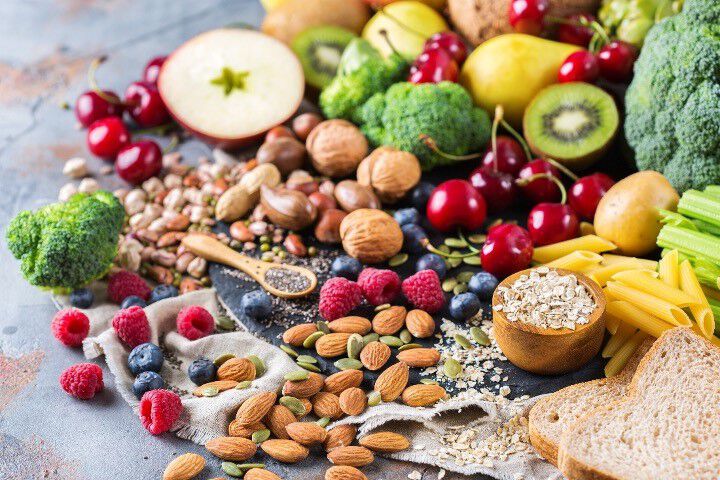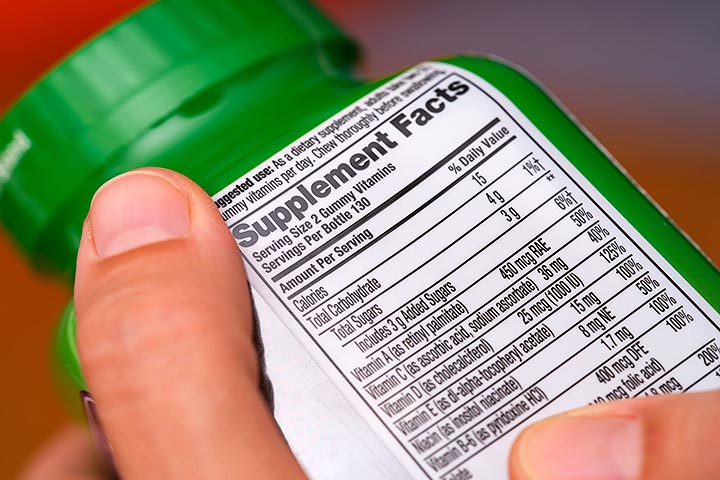Digestive Support
How to Get More Fiber in Your Diet

You may already have heard about the importance of fiber but might be unsure how to get more fiber in your diet. Or you may be wondering why fiber is important in general. Read about the importance of fiber below and some tips to help increase your intake.
What is Fiber and Why is Fiber Important in Your Diet?
Fiber is part of plant-based foods we eat and is not absorbed by our bodies. It passes through our GI tract and helps to move digested waste through too. Fiber is crucial for digestive health and supports regularity.
Over 90% of women and 97% of men in the U.S. do not meet the recommended intakes for dietary fiber. In fact, current intakes of 18 grams per day for men and 16 grams per day for women fall short of the recommended 25-38 grams of fiber per day, as recommended by the Institute of Medicine.
What is Soluble vs Insoluble Fiber?
There are two main types of fiber. Fiber can be either soluble or insoluble—and your body needs both types.
- Soluble fiber: This type of fiber dissolves in water and forms a gel, which helps digestion. Soluble fiber is found in foods like oats, barley, beans, lentils and fruits and vegetables such as oranges, prunes, broccoli and carrots.
- Insoluble fiber: This type of fiber helps to pass foods through your digestive tract. It is often described as a broom, sweeping out waste from your body. Insoluble fiber is found in wheat bran, whole grains, and fruits and vegetables such as avocado, pears, corn, and green beans.
Now that we’ve covered why fiber is important and the different types of fiber, let's get into some ways you can increase your daily fiber intake.
How Can You Get More Fiber in Your Day?
There are several ways to get more fiber in your diet. Keep in mind - fiber is found in plant-based foods. Fiber can also be found in supplements. Here are some easy tips to help increase your fiber intake:
1. Eat Your Vegetables! And Your Fruits!
Eating a wide variety of fruits and vegetables every day is a great way to get the nutrition and fiber that you need. Finding new and creative ways to use and eat vegetables can help you get more fiber and improve your digestive health. The USDA currently recommends consuming 2½ cups of vegetables per day and 2 cups of fruit every day.
There are lots of easy ways to bring delicious fruits and vegetables into your daily diet. Here are some ideas to start you off:
- Roast your veggies: Most vegetables taste fantastic roasted! Try a cup of roasted winter squashes (6g of fiber), broccoli (4g), cauliflower (5g), carrots (4g), onions (4g), or a roasted medium sweet potato (5g) as part of your next meal.
- Sneak in snacks: Make fruits or vegetables your go-to snack. Not only can you enjoy plain fruit or vegetables, but you can also add fruit to yogurt or dip vegetables into hummus. Hummus itself provides 1g of fiber in just 2 tablespoons!
- Fruit for dessert: Bake fruit-based desserts like fruit crumbles (3g of fiber per serving) or enjoy ½ cup of fruit compote (5g). Or, just add 1 cup of raspberries (10g), blackberries (8g) or chopped up fruit to your favorite dessert.
- Air fry veggies: Throw a cup of asparagus (4g of fiber), broccoli (4g), green beans (4g) or cauliflower (3g) into the air fryer to give your vegetables a crispy, tasty texture.
- Zoodle your noodles: Use a vegetable spiralizer to make (or buy pre-made) “noodles” out of zucchini (1g fiber per serving) or butternut squash (3g fiber per serving) and serve as a substitute for pasta or as a fun side dish.
- Avocado addition: One-third of a medium avocado provides 3g of fiber, so making avocado toast or guacamole can add several grams of fiber to your day.
- Get popping: Finally, another snack that can give you more fiber? Popcorn! That’s right, those kernels are whole grains, offering 3.5 grams of fiber per 3 cups of air-popped popcorn.
2. Add a Fiber Powerhouse to Your Day
Beans and lentils, also known as legumes, are chock-full of fiber, along with several other nutrients. They’re also inexpensive, easy to prepare, and a delicious way to add fiber to your day:
- Add ½ cup black beans (adds 9g fiber) to your nachos, quesadillas, or burritos.
- Choose lentil soups at restaurants or from the grocery store – 1 cup has 8g of fiber.
- Bean dips like black bean dip (1g per 2 Tbsp), hummus (1g per 2 Tbsp) or refried beans (7g per ½ cup) make a tasty snack.
- Lentil curries, also known as dals, provide 4g of fiber per ½ cup.
- A warm satisfying bowl of bean chili provides 9g of fiber per cup.
- 1 oz roasted chickpeas, either made from scratch or found at the grocery store, are a wonderful snack, full of 6g fiber and protein.
3. Opt for Whole Grains
Whole grain foods are a delicious way to add more fiber as well as a variety of new and tasty grains to your day. Whole grains include all parts of the grain. You can find whole grain foods by looking for foods with the first ingredient to be “whole grain wheat,” “whole grain corn,” or “whole grain oats”. Other whole grains include brown rice, farro, barley, quinoa and sorghum.
There are so many whole grain options available at the grocery store – whole wheat hamburger buns, whole wheat pitas, brown rice sushi rolls, whole grain pastas, oatmeal, whole grain cereals, and corn tortillas. There are lots of options to explore!
You can find ways to get more fiber even when you’re baking! A simple way includes replacing some of your white baking flour with whole wheat pastry flour. You can start with replacing 1/3 of the flour, and then build up over time to a 1:1 replacement.

4. Include Nuts and Seeds
Nuts and seeds are small but mighty—they add both fiber and protein to your snack time. An ounce of nuts or seeds (that’s the equivalent of a small handful) are considered a serving, so you just need a bit. You can eat them on their own or add them as a topping to other foods you eat such as salads. When baking, you can also use recipes that use almond flour, coconut flour or other nut flours. These alternative flours naturally bring more fiber to the recipe.
5. Take Fiber Supplements
Taking a fiber supplement can be a good way to add to the fiber you’re getting from food. Check with your health care professional to find out if fiber supplements are a good choice for you.
Fiber supplements come in a variety of formats. For many, gummy fiber supplements such as vitafusion™ Fiber Well are a delicious, convenient form to add more fiber to your diet. There’s no mixing or measuring and no chalky taste. With a variety of flavors and fruity tastes, gummy fiber supplements are easy to chew and yummy, too! If minor gas or bloating occurs, reduce daily serving.
Should You Take Fiber Supplements in the Morning or at Night?
It doesn’t matter what time of day you take fiber supplements, it’s just important to include more fiber in your overall day. Include fiber-rich foods at every meal and use fiber supplements like fiber gummies to help increase intake either in the morning or at night.
What is the Best Form of Fiber to Take?
There’s not one best form of fiber. It’s best to eat a variety of fiber-containing foods to help ensure you get the benefits of different types of fiber. Some people find it more comfortable to add more fiber to their day if they ramp up their intake slowly over time, whether with food or supplements. Increasing your fiber intake slowly can help reduce the chance of gas or bloating, which may impact some people if they increase their fiber intake too quickly.
What is a Good Fiber Supplement to Take Daily?
The best fiber supplement to take is the one that you’ll remember to take daily. For some people, the delicious taste and convenience of a fiber gummy helps make it easy to remember to take their fiber supplement every day.
vitafusion™ offers a variety of delicious fiber gummy supplements, including:
- FiberWell - 5 grams of prebiotic fiber per serving and sugar free, with delicious, natural peach, strawberry and berry flavors.
- FiberWell Fit - 4 grams of soluble fiber per serving and 6 B vitamins to support carbohydrate, fat and protein metabolism.*
- Fiber+Probiotics - 3 grams of fiber and 800 million CFUs of probiotics per serving. They are a delicious way to support regularity and digestive health!*
Brought to you by the nutrition experts at vitafusion™



